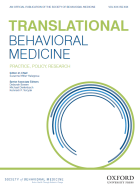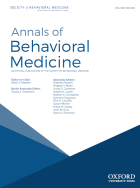
Fall 2022
Editor's Note
 “No one gets left behind” is the theme for the Fall 2022 issue of Outlook. Many of the articles featured engage in dialogues towards a more diverse and equitable healthcare environment.
“No one gets left behind” is the theme for the Fall 2022 issue of Outlook. Many of the articles featured engage in dialogues towards a more diverse and equitable healthcare environment.
Choosing Green: Opportunities for Health Decision Making Research in the Era of Climate Change

Climate change– understood as long-term shifts in our planet’s atmospheric temperatures and weather patterns– poses an enormous threat to global public health. Rising temperatures will escalate the occurrence and severity of extreme weather events, poor air quality, and pervasive disease outbreaks¬; left unaddressed, these changes are only expected to become more frequent and more severe, affecting more people in more places.
When K is More than Just a Letter: Top Tips and Considerations for Early Career Investigators


Building from the OBBI SIG’s previous Outlook article outlining commonly asked questions and optimization resources, this article provides top tips and considerations for optimization-related grant writing for early career investigators.
No Patient Left Behind: Ensuring We Continue Overcoming Barriers in the Age of Telehealth

Telehealth platforms can remove common barriers for treatment including cost, transportation, mobility, and competing time demands. However, as these barriers are addressed, an understanding of new barriers created by telehealth delivery is needed.
Leadership Among Graduate Students and Trainees as a Means of Shaping Future Health Equity Advocates

Graduate students and trainees from marginalized backgrounds face exceptional barriers in their efforts to study health inequities including the scarcity of mentors and personal networks, insufficient experience. Professional organizations like SBM can foster leaders and facilitate the exchange of ideas and information among their members who belong to targeted communities relative to the advancement of health equity in laws, policies, and programs.
LGBTQIA+ and Cancer Care: A Beginner’s Guide for Healthcare Providers

Health care providers need to take positive steps toward promoting the health of LGBTQIA+ patients to reduce barriers to cancer care and improve overall care and outcomes. This article serves to help health care providers create a more inclusive and welcoming environment for LGBTQIA+ cancer patients and improve understanding about barriers that this community faces when seeking medical care.
Using Implementation Science to Bring Mindfulness Interventions into Real-world Settings: A Conversation with A. Rani Elwy, PhD

Implementation science involves the systematic investigation of what it takes to bring an intervention out of the lab and into the more complex world of everyday life. In the wake of the COVID-19 pandemic and increasingly recognized need for adaptation, members of the Integrative Health and Spirituality SIG have focused on implementing mindfulness-based interventions across a range of contexts with the aid of implementation science.
The American Heart Association Adds Sleep to the Cardiovascular Health Checklist: Implications for Behavioral Medicine

As well as being a useful research tool, this cardiovascular health checklist is a simple way for providers and patients to quantify contributors to heart health and discuss habits that might exacerbate risk for heart disease. Importantly, half of the “Essential 8” factors that influence cardiac health are modifiable health behaviors.
Supporting Women with Lifetime Exposures to Violence and Co-occurring Mental Health Symptoms

Adverse life experiences such as violence negatively impact body’s stress regulation and immune response, which can lead to toxicity of stress and trigger a sequalae of various health problems, including PTSD and depression. Continuous or repeated exposures to violence within the same overall context over time (e.g., physical and psychological intimate partner violence) can further heighten mental health symptoms among women.
New Articles from Annals of Behavioral Medicine and Translational Behavioral Medicine


SBM's two journals, Annals of Behavioral Medicine and Translational Behavioral Medicine: Practice, Policy, Research (TBM), continuously publish online articles, many of which become available before issues are printed. Click below to read a selection of Annals and TBM articles that were recently made available online.
Honors and Awards
Congratulations to the following SBM members who recently received awards or were otherwise honored. To have your honor or award featured in the next issue of Outlook, please email aschmidt@sbm.org.
Members in the News
The following SBM members and their research were recently featured in journals, news articles, or videos. To have your news spot featured in the next issue of Outlook, please email aschmidt@sbm.org.
Classifieds
Visit the SBM Job Opportunities page for additional positions.
President's Message: Abortion Access is Personal for Me
The past few months have been eventful, to say the least, and I keep thinking back to a question posed by one of my colleagues during the 2020 SBM elections: “What, exactly, does the SBM president do?” I can assure you that my answer at the time would not have included “stand up for reproductive healthcare rights.”
Read more » >

